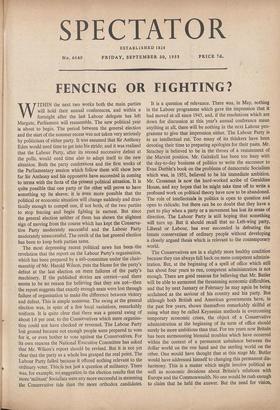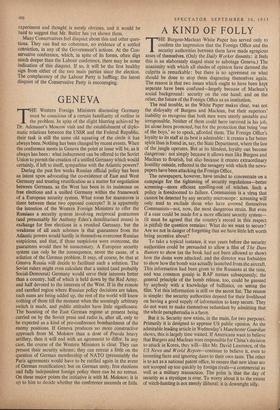FENCING OR FIGHTING?
WITHIN the next two weeks both the main parties will hold their annual conferences, and within a fortnight after the last Labour delegate has left Margate, Parliament will reassemble. The new political year is about to begin. The period between the general election and the start of the summer recess was not taken very seriously by politicians of either party. It was assumed that Sir Anthony Eden would need time to get into his stride; and it was realised that the Labour Party, after its second successive defeat at the polls, would need time also to adapt itself to the new situation. Both the party conferences and the first weeks of the Parliamentary session which follow them will show how far Sir Anthony and his opponents have succeeded in coming to terms with the facts of the present political situation. It is quite possible that one party or the other will prove to have something up its sleeve; it is even more possible that the political or economic situation will change suddenly and dras- tically enough to compel one, if not both, of the two parties to stop fencing and begin fighting in earnest. But since the general election neither of them has shown the slightest sign of moving from the course which has kept the Conserva- tive Party moderately successful and the Labour Party moderately unsuccessful. The result of the last general election has been to keep both parties tame.
The most depressing recent political news has been the revelation that the report on the Labour Party's organisation, which has been prepared by a sub-committee under the chair- manship of Mr. Harold Wilson, puts the blame for the party's defeat at the last election on mere failures of the party's machinery. If the published stories are correct—and there seems to be no reason for believing that they are not—then the report suggests that exactly enough seats were lost through failure of organisation to make the difference between victory and defeat. This is simple nonsense. The swing at the general election was, in spite of a few local variations, remarkably uniform. It is quite clear that there was a general swing of about 1.6 per cent. to the Conservatives which mere organisa- tion could not have checked or reversed. The Labour Party lost ground because not enough people were prepared to vote for it, or even bother to vote against the Conservatives. For its own reasons the National Executive Committee has asked that Mr. Wilson's report should be revised. But it is not yet clear that the party as a whole has grasped the real point. The Labour Party failed because it offered nothing relevant to the ordinary voter. This is not just a question of militancy. There was, for example, no suggestion in the election results that the more 'militant' Socialists were any more successful in stemming the Conservative tide than the more orthodox candidates. It is a question of relevance. There was, in May, nothing in the Labour programme which gave the impression that it had moved at all since 1945, and, if the resolutions which are down for discussion at this year's annual conference mean anything at all, there will be nothing in the next Labour pro- gramme to give that impression either. The Labour Party is in an intellectual rat. Too many of its thinkers have been devoting their time to preparing apologies for their pasts. Mr. Strachey is believed to be in the throes of a restatement of the Marxist position. Mr. Gaitskell has been too busy with the day-to-day business of politics to write the successor to Evan Durbin's book on the problems of democratic Socialism which was, in ,1951, believed to be his immediate ambition. Mr. Crossman is now the hard-worked scribe of Geraldine House, and any hopes that he might take time off to write a profound work on political theory have now to be abandoned. The role of intellectuals in politics is open to question and open to ridicule; but there can be no doubt that they have a part to play when a party or a movement has lost its sense of direction. The Labour Party is still hoping that something will turn up. But it should recall that no Left-wing party. Liberal or Labour, has ever succeeded in defeating the innate conservatism of ordinary people without developing a closely argued thesis which is relevant to the contemporary world.
The Conservatives are in a slightly more healthy condition because they can always fall back on mere competent adminis- tration. But, at the beginning of a spell of office which still has about four years to run, competent administration is not enough. There are good reasons for believing that Mr. Butler will be able to surmount the threatening economic difficulties, and that by next January or February he may again be being acclaimed as the saviour of his country and his party. But although both British and American governments have, in the past few years, shown themselves remarkably skilful at using what may be called Keynesian methods in overcoming temporary economic crises, the object of a Conservative administration at the beginning of its term of office should surely be more ambitious than that. For ten years now Britain has been surmounting biennial troubles which have occurred within the context of a permanent unbalance between the dollar world on the one hand and the sterling world on the other. One would have thought that at this stage Mr. Butler would have addressed himself to changing this permanent dis- harmony. This is a matter which might involve political as well as economic decisions about Britain's relations with Europe and the Commonwealth. No one would be rash enough to claim that he held the answer. But the need for vision, experiment and thought is surely obvious, and it would be hard to suggest that Mr. Butler has yet shown them.
Many Conservatives feel disquiet about this and other ques- tions. They can find no coherence, no evidence of a settled conviction, in any of the Government's actions. At the Con- servative conference, which, in spite of its forms, often digs much deeper than the Labour conference, there may be some indication of this disquiet. If so, it will be the first healthy sign from either of the two main parties since the election. The complacency of the Labour Party is baffling; the latent disquiet of the Conservative Party is encouraging.



































 Previous page
Previous page